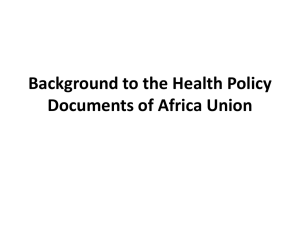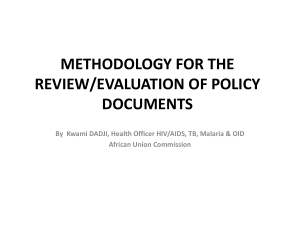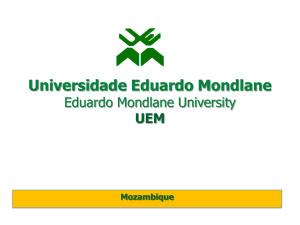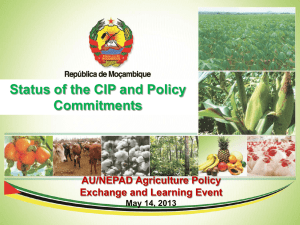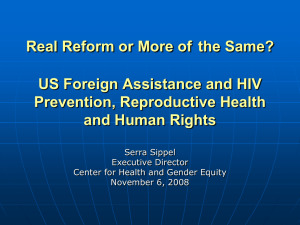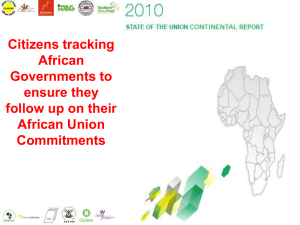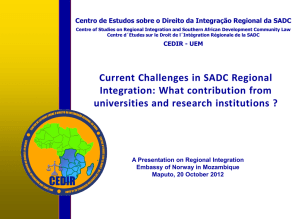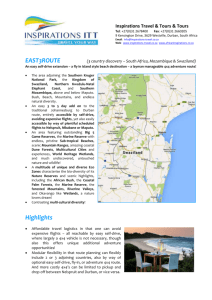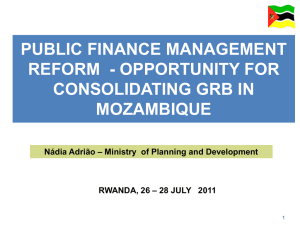maputo-e
advertisement
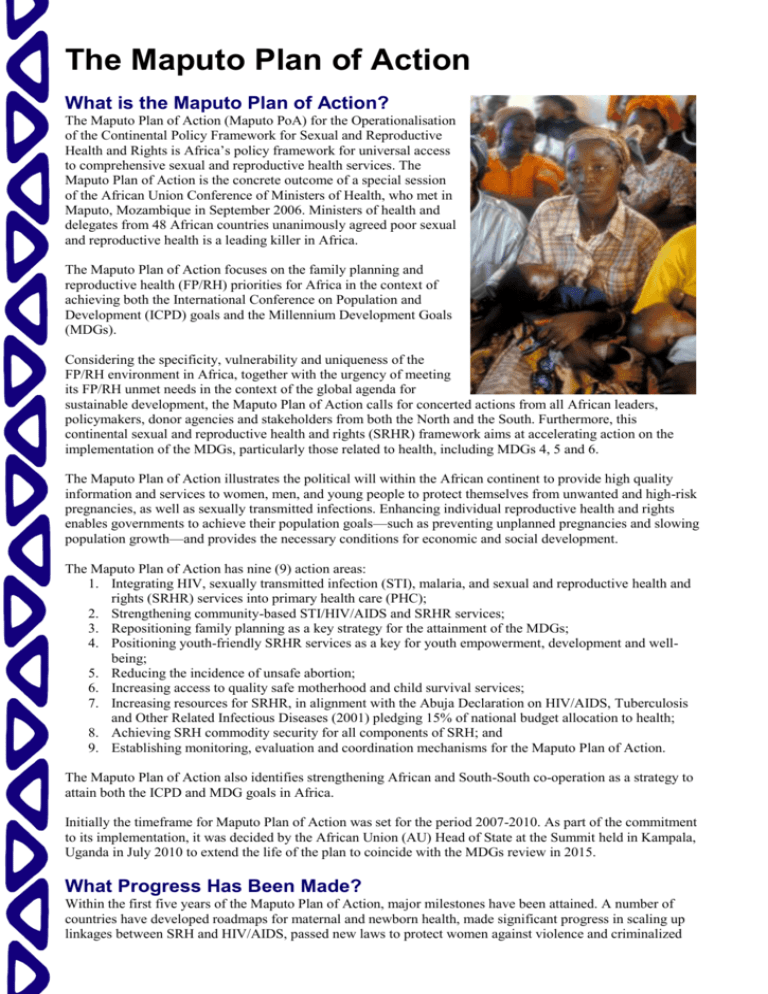
The Maputo Plan of Action What is the Maputo Plan of Action? The Maputo Plan of Action (Maputo PoA) for the Operationalisation of the Continental Policy Framework for Sexual and Reproductive Health and Rights is Africa’s policy framework for universal access to comprehensive sexual and reproductive health services. The Maputo Plan of Action is the concrete outcome of a special session of the African Union Conference of Ministers of Health, who met in Maputo, Mozambique in September 2006. Ministers of health and delegates from 48 African countries unanimously agreed poor sexual and reproductive health is a leading killer in Africa. The Maputo Plan of Action focuses on the family planning and reproductive health (FP/RH) priorities for Africa in the context of achieving both the International Conference on Population and Development (ICPD) goals and the Millennium Development Goals (MDGs). Considering the specificity, vulnerability and uniqueness of the FP/RH environment in Africa, together with the urgency of meeting its FP/RH unmet needs in the context of the global agenda for sustainable development, the Maputo Plan of Action calls for concerted actions from all African leaders, policymakers, donor agencies and stakeholders from both the North and the South. Furthermore, this continental sexual and reproductive health and rights (SRHR) framework aims at accelerating action on the implementation of the MDGs, particularly those related to health, including MDGs 4, 5 and 6. The Maputo Plan of Action illustrates the political will within the African continent to provide high quality information and services to women, men, and young people to protect themselves from unwanted and high-risk pregnancies, as well as sexually transmitted infections. Enhancing individual reproductive health and rights enables governments to achieve their population goals—such as preventing unplanned pregnancies and slowing population growth—and provides the necessary conditions for economic and social development. The Maputo Plan of Action has nine (9) action areas: 1. Integrating HIV, sexually transmitted infection (STI), malaria, and sexual and reproductive health and rights (SRHR) services into primary health care (PHC); 2. Strengthening community-based STI/HIV/AIDS and SRHR services; 3. Repositioning family planning as a key strategy for the attainment of the MDGs; 4. Positioning youth-friendly SRHR services as a key for youth empowerment, development and wellbeing; 5. Reducing the incidence of unsafe abortion; 6. Increasing access to quality safe motherhood and child survival services; 7. Increasing resources for SRHR, in alignment with the Abuja Declaration on HIV/AIDS, Tuberculosis and Other Related Infectious Diseases (2001) pledging 15% of national budget allocation to health; 8. Achieving SRH commodity security for all components of SRH; and 9. Establishing monitoring, evaluation and coordination mechanisms for the Maputo Plan of Action. The Maputo Plan of Action also identifies strengthening African and South-South co-operation as a strategy to attain both the ICPD and MDG goals in Africa. Initially the timeframe for Maputo Plan of Action was set for the period 2007-2010. As part of the commitment to its implementation, it was decided by the African Union (AU) Head of State at the Summit held in Kampala, Uganda in July 2010 to extend the life of the plan to coincide with the MDGs review in 2015. What Progress Has Been Made? Within the first five years of the Maputo Plan of Action, major milestones have been attained. A number of countries have developed roadmaps for maternal and newborn health, made significant progress in scaling up linkages between SRH and HIV/AIDS, passed new laws to protect women against violence and criminalized harmful practices against women and expanded family planning programming. Many of the key policies forming the foundation for action for the Maputo Plan of Action are now in place at the country level. However, progress on implementation varies between countries. Energizing Efforts to Achieve the Maputo Plan of Action The extension of Maputo PoA is an opportunity for the African continent to propel action and generate political will and support for the attainment of the ICPD and MDGs targets. In May 2009, the African Union launched the Campaign on Accelerated Reduction of Maternal Mortality in Africa (CARMMA). The Maputo Plan of Action and CARMMA both address the two targets of MDG5, reducing maternal mortality and assuring universal access to reproductive health. These complementary efforts will increase the attention and commitment to the end result – achieving MDG5 (and others) by 2015. The key strategy is for African governments, civil society, the private sector and all development partners to join forces and redouble efforts, so that together the effective implementation of the continental policy in all countries in Africa can be achieved. The African Union should continue its advocacy role, conduct resource mobilization, monitoring and evaluation, dissemination of best practices and harmonization of policies and strategies. Regional Economic Communities need to provide technical support to countries, advocate for increased resources, harmonize implementation, monitor progress, and share best practices. Countries in Africa should incorporate all action areas of the Maputo Plan of Action into current strategies and roadmaps for reducing maternal and infant mortality. The Maputo Plan of Action should be used as a guide at the country level to examine population and reproductive health policies and ensure that the necessary financial and human resources are allocated and expended in national budgets. Countries should also advocate, raise additional resources, and invite civil society and the private sector to participate in national programmes. Members of Parliament, as key stakeholders, must play their legislative, representative, budget appropriation, and oversight roles. They and other policymakers must ensure that SRHR is included in development planning and funding mechanisms such as Poverty Reduction Strategy Papers (PRSPs), Sectorwide approaches (SWAps), the Global Fund to fight AIDS, Tuberculosis, and Malaria and PEPFAR. Partners, including non-governmental organizations (NGOs), civil society organizations (CSOs) and other development partners, need to align their financial and technical assistance and cooperation plans with national and regional needs, in line with country-driven development plans and budgeting. Universal access to family planning and reproductive health services is critical for the achievement of MDG5 and essential to the other MDGs. The Maputo Plan of Action is the vehicle in Africa for their attainment. It is time to refocus our efforts on ensuring its success. Resources: Maputo Plan of Action for the Operationalisation of the Continental Policy Framework for Sexual and Reproductive Health and Rights: 2007-2010 (2006) Millennium Development Goals (2000) International Conference on Population and Development (ICPD) Programme of Action (1994) Department of Social Affairs, African Union Commission. Factsheet: AU Campaign on Accelerated Reduction of Maternal Mortality in Africa (CARMMA) Abuja Declaration on HIV/AIDS, Tuberculosis and Other Related Infectious Diseases (2001) Abuja Call for Accelerated Action Towards Universal Access to HIV and AIDS, Tuberculosis and Malaria Services in Africa (2006) Photo Credit: © 2000 Liz Gilbert/David and Lucile Packard Foundation, Courtesy of Photoshare Partners in Population and Development Africa Regional Office (PPD ARO) Statistics House, 3rd Floor, 9 Colville Street, P.O. Box 2666, Kampala, Uganda Office: (+256) 414-705-446 http://www.ppdafrica.org/ aro@ppdafrica.org
